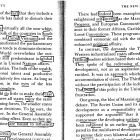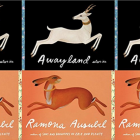Collective Despair in Ana Blandiana’s Five Books

Five Books
Ana Blandiana, translated by Paul Scott Derrick and Viorica Patea
Bloodaxe Books | April 12, 2022
Romania has a strong poetic tradition, and Ana Blandiana represents one of its most beloved contemporary voices. Known for her civic involvement before and after the Romanian Revolution, writing about the country has informed Blandiana’s prolific career. In the introduction to Five Books (composed of five collections: Four Poems from Amfiteatru, Predator Star, The Architecture of Waves, Clock Without Hours, October, November, December, Variations On A Given Theme), co-translator Viorica Patea explains how several of the poems in the collection (specifically those from Amfiteatru) “circulated underground” and that they were “instantly recognised as the outcry of a collective despair.” Indeed, these poems offer an uncensored, searing reality of the poverty that Communism created, depicted as an imagistic tragedy from the perspective of those who suffered through it.
The poems in this collection hammer this historical context home: for example, in “Everything”, Blandiana writes that she is willing to face concrete consequence to write about “the queues to buy flour” in a poem—to be censored, banned from publishing, called in for questioning as a result of mentioning that mere image. For a Romanian reader, the reference to something otherwise so banal (i.e., buying flour) is something of a totemic symbol for the insufficiencies that the entire era represented, and so succeeds in conveying a zeitgeist in very few words. For the non-Romanian reader, analytical, explanatory footnotes give the socio-political context of the population reaching a fever pitch under a harsh regime.
It is tempting to compare Blandiana to Samizdat poets such as Akhmatova or Tsvetaeva for the courageous way she writes about tragedy under a totalitarian regime. But what sets Blandiana apart is her postmodern style and technique. Her writing is grave and floaty, the poems are undeniably philosophical, evocative, and open to interpretation: for instance, in Predator Star, the image of “twins in the womb of terror” brings to mind political prisoners in a single cell, heightened by the fact that Blandiana’s own father was one himself. These poems are ekphrastic, airy, and abstract yet deft, suggesting an enlightened detachment from the body: for example, in “Lullaby,” “Drop like a guillotine’s blade and / Lop off the head of the world outside”. These surreal, otherworldly images become a mode of self-construction. At times, a deliberate faltering can be sensed in this self::
I was told to search for you
And I, I only wanted the search.
I hadn’t even thought about
What I’d do with you
If I ever found you:
Plant you in the earth like a seed? (“Nec Plus Ultra”)
Here Blandiana creates an unsettling world, vacillating between the natural and the metaphysical, described by the voice of someone who is certain of her convictions but uncomfortable in her surroundings. Throughout the collection, she dissects and spiritualizes experiences at the same time, in a somehow gnostic manner, suggesting the body’s response to the world—self-referential and self-doubting at the same time. The tone is haunting, as it is in “The Art of Dying”: “I’ve learned you patiently / Like a childhood prayer.” She is rigorous and imperative in questioning the world.
At the heart of her world is national anxieties, which Blandiana tackles again and again in her poems. In “Beneath the Snow,” the language used is sparse, yet indicative of both a major communal and personal drama:
As everyone has gone
To harvest strawberries in Spain,
The empty town looks almost like it did
When you were a child,
Except that the dome of the church,
Covered in tin,
Is uglier now.
The young seek monetary opportunities in Western Europe while the elderly are left behind in ghost towns. In this profound portrait, Blandiana reveals the country’s grief, along with her own.
A monumental effort on the part of the translators Paul Scott Derrick and Viorica Patea, Five Books offers an excellent overview of Ana Blandiana’s work. This is a poet who never exhausts her reader with excess, but walks a fine line throughout her entire opus, combining simple and natural language with profound psychological, social, and historical processes. The overarching effect is tremendous.



